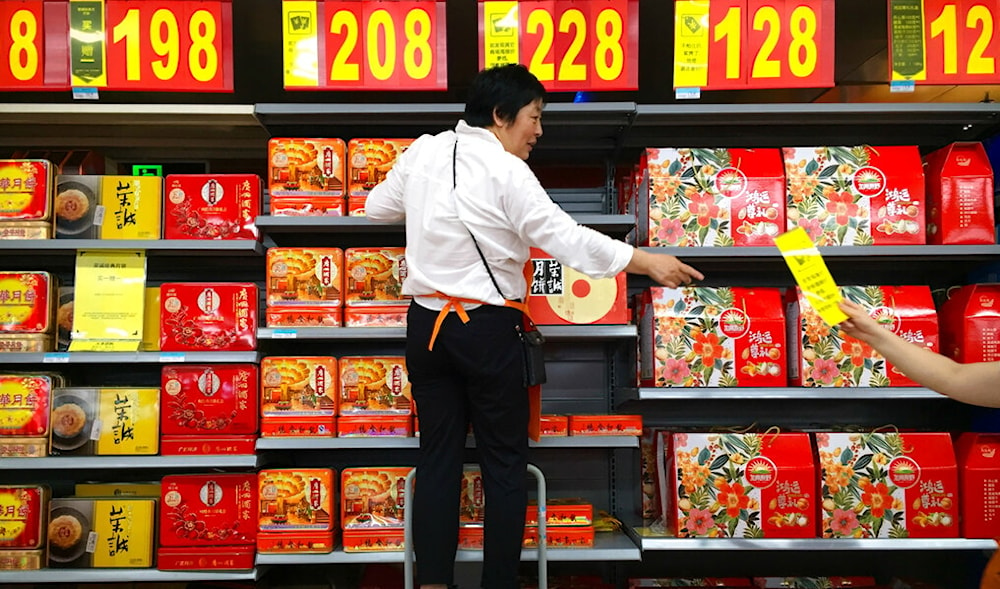China’s new tariffs on US goods take effect as consumers adapt
Chinese consumers seem to be unfazed by the tariffs imposed on US goods, affirming quality prioritization over country of production.
-

An employee stands on a stepladder as she stocks boxes of mooncakes at a supermarket in Beijing, on Wednesday, September 14, 2016. (AP)
China’s latest tariffs on a range of US agricultural products, including fruit, vegetables, meat, and grains, took effect on Monday, but shoppers at a bustling Beijing market appeared largely unfazed by the escalating trade war.
The tariffs—ranging between 10 and 15%—were introduced in response to US President Donald Trump’s decision last week to raise duties on all Chinese imports to 20 percent. Despite concerns about rising prices, vendors at a downtown market said they were not worried about sales.
China has also announced tariffs on more than $2.6 billion worth of Canadian agricultural and food products, retaliating against trade restrictions Ottawa imposed in October. The move intensifies tensions in an ongoing trade dispute, largely fueled by US President Donald Trump's tariff policies.
The Chinese Commerce Ministry stated on Saturday that the tariffs, set to take effect on March 20, will mirror Canada's 100% and 25% import duties on Chinese electric vehicles, steel, and aluminum. However, Beijing notably excluded canola—a key Canadian export—possibly signaling openness to future negotiations.
According to analysts, the tariffs serve as both economic retaliation and a strategic warning, particularly as the Trump administration considers easing its own 25% import levies on Canada and Mexico. Washington has warned that relief could be contingent on whether they implement a similar 20% duty Trump has imposed on Chinese imports, using fentanyl-related concerns as an excuse.
'More domestic goods sold'
"If prices go up, folks won't eat imported stuff," said a fruit vendor, surnamed Shi. "There will be more domestic goods sold, and I think this is something folks can accept."
Shi, who sells a variety of fruit from around the world—including bananas, strawberries, durian, and mangosteen—said that Chinese-grown produce tends to sell better due to its freshness. He added that he might stock fewer US fruits while increasing supplies from countries like Thailand and Malaysia.
He Yulian, a 65-year-old from Shanxi visiting her daughter in Beijing, said the trade war did not concern her. She prioritized quality over the product’s country of origin.
"For regular folks, if we can tell something is imported from the United States, we can try to buy less of it—or not at all," she said.
The new tariffs officially took effect on Monday, though goods that departed before March 10 will be exempt if they reach China by April 12.
While acknowledging that the trade dispute was affecting both sides, Shi said the situation could ultimately strengthen China's domestic market. "The fight would be better for China because domestic goods would become more powerful," he said.
However, he also recognized the immediate financial strain on consumers. "You still need to buy what you need at home," he noted. "Indeed, it's regular people who suffer the most."
Concerns over food safety
Despite the preference for domestic goods, some shoppers still favored imports for specific items. He admitted she trusted imported milk and infant formula over Chinese brands, citing past food safety scandals.
China has faced multiple food safety crises, with one of the most infamous incidents occurring in 2008 when milk contaminated with melamine led to the deaths of six infants and the poisoning of hundreds of thousands of others. Although Beijing has pledged stricter food safety measures, skepticism remains.
"It's not that we're not patriotic," He said. "It's because we have a responsibility to ourselves."
Read more: How China may capitalize on damage made by Trump: The Guardian

 4 Min Read
4 Min Read








